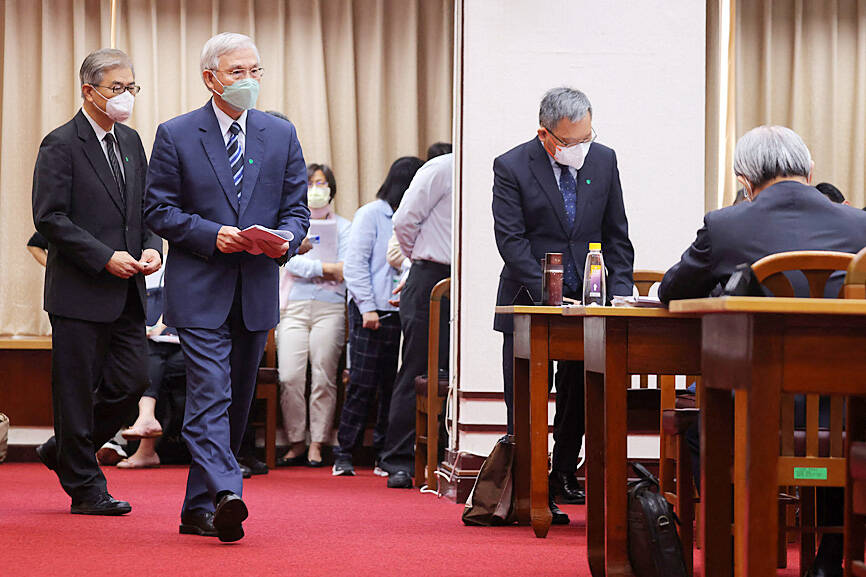The US has not found any of its major trading partners manipulating exchange rates to gain unfair competitive advantages, although seven economies including Taiwan are on its monitoring list, the central bank said yesterday.
The US Department of the Treasury on Thursday announced its conclusion in its semi-annual report to the US Congress on macroeconomic and foreign exchange policies of major trading partners.
Taiwan, along with China, Japan, South Korea, Germany, Malaysia and Singapore, is on the list.

Photo: Annabelle Chih, REUTERS
Taiwan’s large trade surplus and current account surplus with the US earned it the spot, but there is no need for enhanced engagement, the central bank said.
Strong exports have previously inflated Taiwan’s current account surplus and attracted hot money, the central bank said.
In the latest report, the US Treasury reviewed and assessed the policies of major US trading partners that account for about 80 percent of US foreign trade in goods and services over the four quarters through June.
The global economy saw supply and demand imbalances caused by the COVID-19 pandemic prior to Russia’s invasion of Ukraine, which has increased food, fertilizer and energy prices — further elevating global inflation and increasing food insecurity, it said.
The report acknowledged that emerging and developing economies might need a range of approaches — including intervention — to respond to current global economic conditions.
However, the bulk of interventions sought to strengthen their currencies, rather than weaken them, the report said.
Taiwan’s central bank has said it intervened in the foreign exchange market several times this year to slow the New Taiwan dollar’s depreciation caused by aggressive capital outflows in response to drastic monetary tightening by major central banks attempting to tame inflation.
US Secretary of the Treasury Janet Yellen said approaches to tackling global economic headwinds were warranted in certain circumstances.
The US Treasury said it would stay in close contact with Switzerland on its currency practices and trade imbalances.
Taiwan held several meetings with the US to exchange views on bilateral trade, economy and exchange rates, the central bank said, adding that currency rates largely reflect an economy’s fundamentals.
The US said it understood and supported Taiwan’s policy measures during the pandemic to shore up disadvantaged groups and stimulate domestic demand.
Taiwan’s communication channel with the US Treasury is smooth, and the two sides would continue to exchange views on economic and foreign exchange issues, the central bank said.
The report also reiterated US Treasury’s call for increased transparency from China.

SEMICONDUCTOR SERVICES: A company executive said that Taiwanese firms must think about how to participate in global supply chains and lift their competitiveness Taiwan Semiconductor Manufacturing Co (TSMC, 台積電) yesterday said it expects to launch its first multifunctional service center in Pingtung County in the middle of 2027, in a bid to foster a resilient high-tech facility construction ecosystem. TSMC broached the idea of creating a center two or three years ago when it started building new manufacturing capacity in the US and Japan, the company said. The center, dubbed an “ecosystem park,” would assist local manufacturing facility construction partners to upgrade their capabilities and secure more deals from other global chipmakers such as Intel Corp, Micron Technology Inc and Infineon Technologies AG, TSMC said. It

EXPORT GROWTH: The AI boom has shortened chip cycles to just one year, putting pressure on chipmakers to accelerate development and expand packaging capacity Developing a localized supply chain for advanced packaging equipment is critical for keeping pace with customers’ increasingly shrinking time-to-market cycles for new artificial intelligence (AI) chips, Taiwan Semiconductor Manufacturing Co (TSMC, 台積電) said yesterday. Spurred on by the AI revolution, customers are accelerating product upgrades to nearly every year, compared with the two to three-year development cadence in the past, TSMC vice president of advanced packaging technology and service Jun He (何軍) said at a 3D IC Global Summit organized by SEMI in Taipei. These shortened cycles put heavy pressure on chipmakers, as the entire process — from chip design to mass

People walk past advertising for a Syensqo chip at the Semicon Taiwan exhibition in Taipei yesterday.

NO BREAKTHROUGH? More substantial ‘deliverables,’ such as tariff reductions, would likely be saved for a meeting between Trump and Xi later this year, a trade expert said China launched two probes targeting the US semiconductor sector on Saturday ahead of talks between the two nations in Spain this week on trade, national security and the ownership of social media platform TikTok. China’s Ministry of Commerce announced an anti-dumping investigation into certain analog integrated circuits (ICs) imported from the US. The investigation is to target some commodity interface ICs and gate driver ICs, which are commonly made by US companies such as Texas Instruments Inc and ON Semiconductor Corp. The ministry also announced an anti-discrimination probe into US measures against China’s chip sector. US measures such as export curbs and tariffs